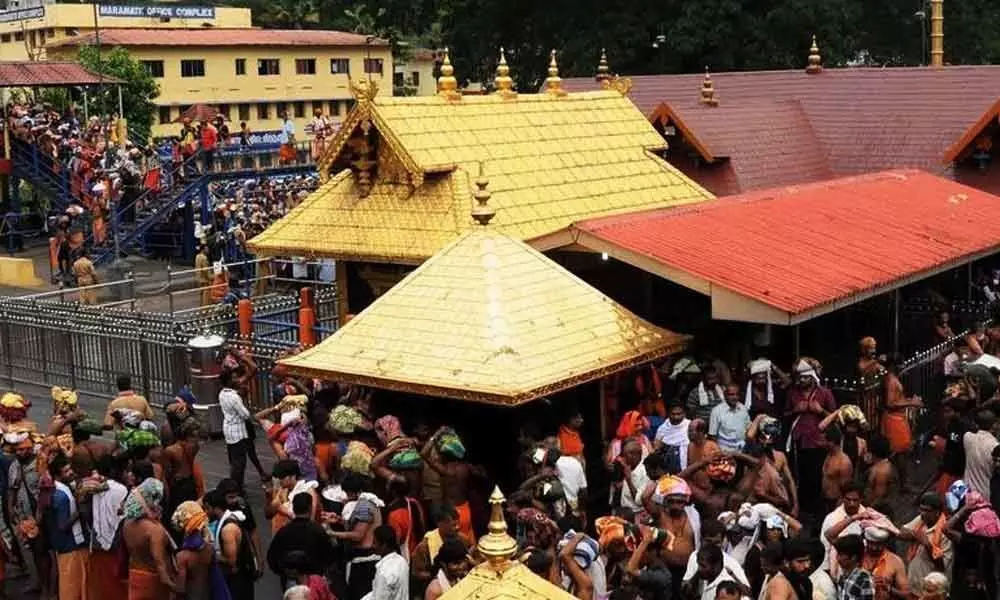Live
- Deputy CM Bhatti Vikramarka Inaugurates Power Substation, Criticizes BRS
- Major Phase in Old City Metro Land Acquisition, Cheques to Be Distributed
- Tragic Road Accident Near Medchal Checkpost: Family of Three Killed, Child Injured
- Road Accident on Hyderabad-Warangal National Highway: One Dead, Five Injured
- Massive Fire Breaks Out at Minerva Hotel in Hyderabad’s Himayatnagar
- PM Modi sets ball rolling for India to become world’s 2nd largest metro rail network
- Sexual assault case: Anna University asks students to use only bicycles inside campus
- Lack of genuine political leadership led to Manipur violence: Apex Meitei body
- Stage 3 restrictions under GRAP lifted in Delhi-NCR as AQI shows improvement
- No room for unmarried couples: Oyo explains check-in policy for partner hotels
Just In
Delay of Sabarimala verdict amounts to denial of justice to women


The apex court's decision to push the Sabarimala case to a larger bench has not only the potential to delay the case, but also could lead to decide whether this country could continue with its religious practices unhindered and unfettered by the law of the land.
The apex court's decision to push the Sabarimala case to a larger bench has not only the potential to delay the case, but also could lead to decide whether this country could continue with its religious practices unhindered and unfettered by the law of the land.
It is time India decides. Discrimination against women is a sad story in every country. This discrimination has been perpetuated in various forms at various times.
When it comes to religion, the practice is all the more pervasive. The larger Bench will not be looking at the Sabarimala issue from women's rights angle alone, it is going to look at the fundamental rights enshrined in the Constitution in Articles 25-28.
The Preamble of the Indian Constitution has the word "secular", and Articles 25 to 28 implying that the State will not discriminate, patronise or meddle in the profession of any religion.
However, it shields individual religions or groups by adding religious rights as fundamental rights. Article 25 says, "all persons are equally entitled to freedom of conscience and the right to freely profess, practice, and propagate religion subject to public order, morality and health."
Further, Article 26 says that all denominations can manage their own affairs in matters of religion. All these rights are subject to be regulated by the State. The Indian version of secularism is a little bit different from what is understood in the western European countries.
In the west, State and church (religion) are separate and do not intervene in each other's internal affairs. But this is not the case with India, where secularism means 'respect for all religions' and 'keeping a principled distance' from each religion.
The Indian Constitution permits the Central government to intervene in religion, but this intervention should be based on the Constitution only.
If some tenets, principles or beliefs of any particular religion violates the Constitution or the law of the land, then the Indian government is mandated to intervene and remedy the situation.
The government of India has occasionally intervened in religions ostensibly as mandated in the Constitution. The enactment of Anti-Untouchability Act (SC/ST Act,1989) and also the recent law banning triple talaq among the Muslim community are examples of such a constitutionally-mandated intervention.
The government also intervenes when women of any religion are denied opportunities or equality as gender equality is guaranteed by the Indian Constitution. Article 25 (2b) uses the term "Hindus" for all classes and sections of Hindus, Jains, Buddhists and Sikhs.
Buddhists and Sikhs objected to this wording that makes many Hindu personal laws also applicable to them. However, the same article also guarantees the right of members of the Sikh faith to bear a kirpan.
Religions require no registration. The government has set up the Ministry of Minority Affairs, the National Human Rights Commission (NHRC) and the National Commission for Minorities (NCM) to investigate religious discrimination and to make recommendations for redressal to the local authorities.
However, all these measures have not helped us establish equality... more so the gender equality. Women are the worst sufferers in the patriarchal societies. Hope the larger bench ensures justice of every kind to them.

© 2024 Hyderabad Media House Limited/The Hans India. All rights reserved. Powered by hocalwire.com






